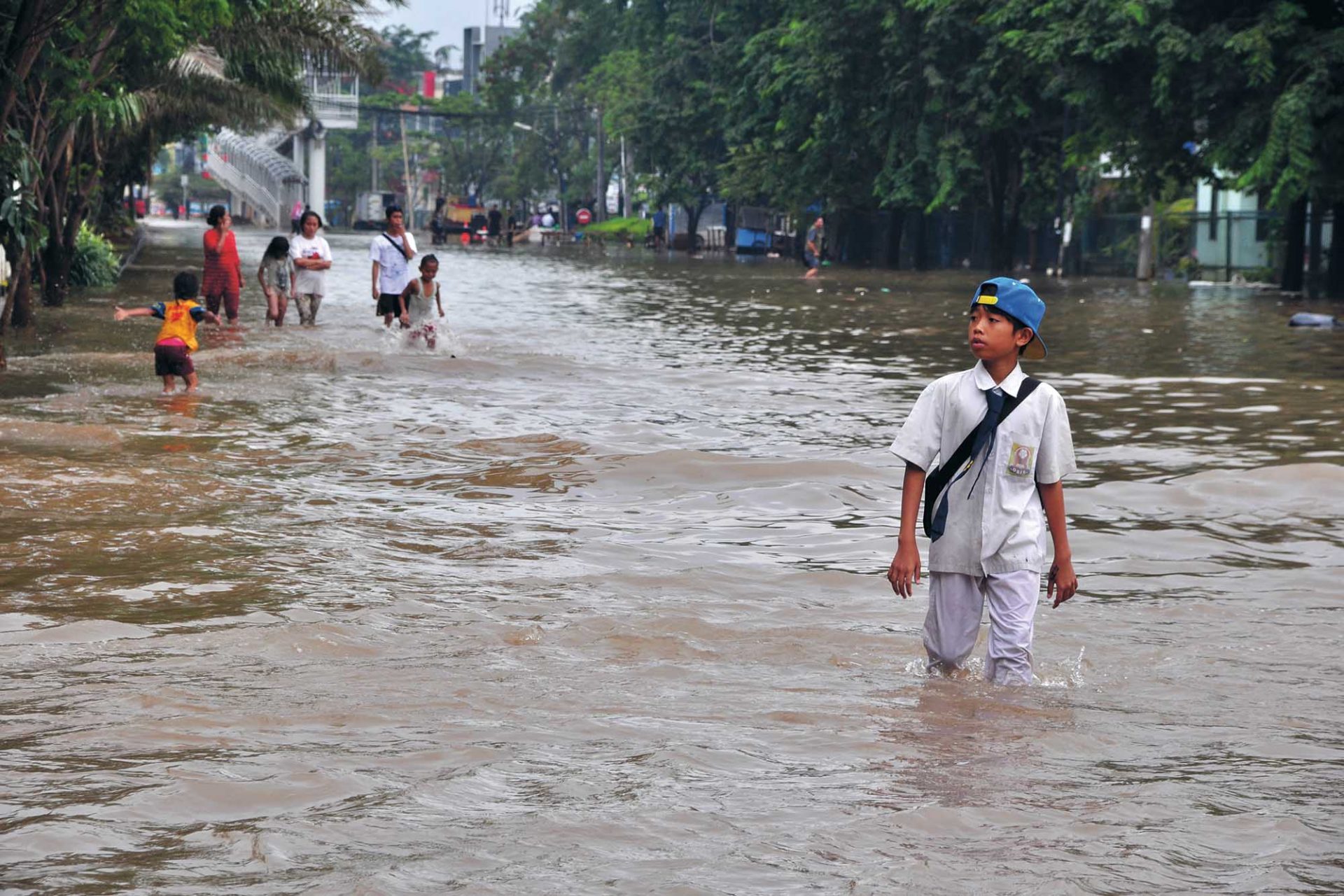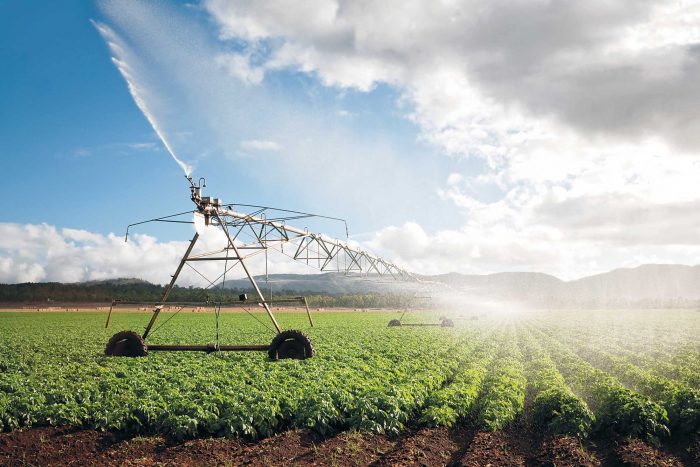A New ‘Normal’ for Australia and Indonesia on Climate Change

Collaborating with Indonesia on climate change creates another pillar and new opportunities for Australia’s engagement with our rapidly growing neighbour.
The last five years have seen much dysfunction in the Australia-Indonesia relationship: from the outrage caused by the Australian decision to ban live cattle exports in 2011 to Australian indignation at the execution of Andrew Chan and Myuran Sukumaran in 2015. On both sides of the Arafura Sea, misunderstandings and overreactions by governments have contributed to diplomatic crises. But behind these events has also been a rapidly changing bilateral dynamic, driven largely by changes in Indonesia’s economic and perceived political power relative to Australia.
Indonesia recovered rapidly from the 1990s Asian Financial Crisis and returned to a period of sustained economic growth. Over the last 15 years, Indonesia’s GDP growth rate has been consistently higher than Australia’s, hovering between 4 and 6 per cent, compared with 2 to 4 per cent. This growth has brought millions out of poverty. During the same time, Indonesia has been going through a political transition, creating the third-largest democracy in the world.
With these changes, and buoyed by the election of a popular “new developmentalist” President Joko Widodo in 2014, Indonesia no longer appears to be satisfied with the donor-aid dynamic that had dominated the relationship in years past. It is increasingly asserting itself as an equal to Australia, a “normal country” to be reckoned with like other middle-income countries with whom Australia engages.
Recognising these shifts, the Australian government has sought to reframe its relations with Indonesia on issues of greater mutual benefit, particularly economic relations. However, more could be done to make sure Australia has a diversified and balanced relationship and climate change is a policy which Australia should bring into the centre of relations. Aside from being an important issue in its own right, climate change complements existing Australian foreign policy priorities, and it is an area where shared interests create the conditions for a more “normal” relationship.
Australian economic diplomacy with Indonesia
To understand the ways in which climate change is a useful issue for the relationship, it is important to understand Australia’s current policy towards Indonesia.
Responding to Indonesia’s changing place in the world, the current Coalition government has shifted away from the previous focus on aid and development, towards a new narrative of “economic diplomacy”. Discussing Australia’s new approach in March 2016, Prime Minister Turnbull said: “Indonesia is on track to become the world’s fifth largest economy around 2030 … we are doing everything we can to ensure our exporters are as well positioned to meet Indonesia’s vast market opportunities.”
This emphasis on economic relations is reflected across the government’s approach to Indonesia. For instance, the government has sought to fast-track stalled negotiations of the Indonesia-Australia Comprehensive Economic Partnership Agreement (IA-CEPA).
On security issues too, the relationship is now framed in terms of economic potential. The 2016 Australian Defence White Paper says that “[Indonesia’s]… economic development [and] … growth presents opportunities to build prosperity for both Australia and Indonesia.” This emphasis on Indonesia’s economic importance represents a shift away from previous white papers which framed Indonesia’s importance in terms of its strategic advantage to Australia, a “buffer” from possible invading forces in Northeast Asia.
The Coalition government has also dramatically downsized its aid to Indonesia with Australian aid to its former single largest recipient reduced by 40 per cent in 2015. The aid funding that remains has, in part, focused on efforts to build Indonesia’s institutions and institutional capacity to allow markets, investment and trade to drive economic growth.
In the context of an increasingly confident Indonesia, this focus on economic relations could be an important pillar for a more “normal” relationship. There are many countries in Asia with which Australia has had long periods of relatively stable relations, such as Japan and China, which are characterised by strong economic relationships. However, underpinning the faith in the economic diplomacy model for Indonesia relations is an assumption that Indonesian growth will continue. There are many possible inhibitors to growth, but one which has received relatively little attention in Australian foreign policy is climate change.
Climate change could destabilise economic diplomacy
Indonesia is particularly vulnerable to climate change. People living in regions near the equator are already living near the upper ranges of temperatures in which humans can survive. Increases in temperature, which Indonesia is already experiencing and will continue to experience, from climate change, will, at a minimum, make it much harder for people to work productively. If temperatures rise enough, parts of Indonesia may become uninhabitable. A 2013 study suggests for instance, that Jakarta may become uninhabitable sometime between the period of 2029 and 2042, depending on the level of greenhouse gas mitigation.
The reason why some regions may become uninhabitable is because increases in temperature are also expected to compress Indonesia’s already high levels of rainfall into shorter time periods. At the same time, increases in global average temperatures are expected to continue to result in increases in sea levels. Taken together, this creates a severe flood risk for coastal cities, which are some of the largest population centres in the country. Should these cities become uninhabitable, Indonesia could face a major problem with internally displaced people.
These predictions would be very significant indeed for the Australia-Indonesia relationship. At one extreme, climate change could lead to a large-scale humanitarian emergency of displaced people at Australia’s doorstep and at best climate change could diminish Indonesia’s economic growth rate. The Asian Development Bank anticipates that if no action is taken to address climate change in this region, it may lose up to 11 per cent of its GDP by 2100. A large reduction in GDP growth of this nature would quickly undermine the ability of the consuming class in Indonesia to buy Australian exports.
Addressing climate change over the long term with Indonesia is thus in Australia’s interests if the economic diplomacy model of relations is to persist. This position seems to be accepted by parts of the Australian Government with the Defence white paper noting: “Climate change will be a major challenge for countries in Australia’s immediate region … these effects will exacerbate the challenges of population growth and environmental degradation, and will contribute to food shortages and undermine economic development.”
Shared interests on climate change
While maritime borders mark the sovereign territorial limits of Australia and Indonesia, the impacts of climate change know no boundaries. And Australia’s economy is not, and will not continue to be, spared by a changing climate. To take one example, a 2015 study on the impact of increased temperatures on labour productivity and absenteeism, shows that heat stress could cost the Australian economy billions of dollars.
Aside from the economic impacts which they each face, Australia and Indonesia will also both face some consequences of climate change on the countries in our shared neighbourhood. The Indo-Pacific region includes other developing and highly vulnerable countries exposed to climate change. Climate impacts in mainland Southeast Asia, for instance, are likely to contribute to hundreds of thousands of internally displaced people. Human displacements of this magnitude could have flow-on effects to both Indonesia and Australia.
Both countries also share ongoing difficulties in creating policies to address emission reductions in their own countries. Their carbon emission profiles are made up of greenhouse gases from similar sources with a major source of emissions from coal-based energy production and land use changes. Thus in both of their pledges to the United Nations to reduce emissions, Indonesia and Australia emphasised increasing their respective share of renewable energy.
Australia has been generating more of its energy from renewable sources in recent years and in the 2013-14 year, the share was around 15 per cent. Indonesia’s share of renewable energy in its generating mix is lower, at around 6 per cent. Nonetheless, in both countries, the share of renewable energy needs to grow to meet their respective emission reduction targets.
Both countries also share the experience of having unstable domestic climate change policy. In the 2010s both were led by politicians eager to take a global leadership position on climate change (the Rudd/Gillard Labor government in Australia and President Susilo Bambang Yudhoyono in Indonesia), who introduced ambitious domestic climate change policies only to have these reshaped by the new administrations. Both countries now face the difficulty of balancing domestic political considerations and their international climate change pledges, and both are doing so in the context of having access to substantial coal resources.
The silver lining in the fact that Australia and Indonesia face shared risks in dealing with climate change impacts, and shared difficulties in developing sustained climate change policy; is that both countries can engage with each other on this topic on an equal footing. Where it is difficult to have a relationship between equals with Indonesia on some bilateral issues, climate change is an area where Australia has many shared interests with the country.
Ideas for collaboration
Climate change has featured and continues to feature, in bilateral relations. During the previous Labor government, Australia ran a (now closed) large-scale aid project – the Indonesia-Australia Forest Carbon Partnership – aimed at assisting Indonesia to manage its emissions from the forestry sector. The current government has continued this emphasis on the land sector supporting programs to manage Indonesia’s forest fires. While these aid programs are a useful start, it is time to consider climate change as a major plank of Australia’s international relations with Indonesia and the region.
Here are two specific policy ideas which, with further analysis, could contribute to a comprehensive bilateral climate change program between Australia and Indonesia, and which would bring in stakeholders other than government to strengthen ties.
It is in both countries interests to take a leadership position on climate change and try and develop regional mechanisms early before climate change potentially creates large human displacements in the region. Such a mechanism could operate similarly to the Bali Process, in which Australia and Indonesia take a leadership role in discussions on people smuggling, human trafficking and international crime.
In addition to the security challenges, the Paris Agreement on Climate Change agreed at the end of last year, including by Australia and Indonesia, created a framework through which countries could collaborate on developing climate change policy. In this context, it would be useful to think more strategically about the ways that countries in the region could develop integrated responses to climate change. A Regional Climate Change Leadership Dialogue could consider questions such as: whether it would it be possible to link emissions trading markets in the region over time, such as the Indonesian Climate Trust Fund and the Australian Emissions Reduction Fund; if it would be possible build a Southeast Asia-wide emissions trading scheme, perhaps building off the ASEAN Economic Community; and whether new regional protocols should be developed on how countries could respond to the security and natural risks created by climate change.
Indonesia aims to raise the share of renewable energy to 25 per cent by 2025, but it is starting from a very low base. There are a number of stumbling blocks to its ability to meet these renewable energy targets, including getting adequate finance to renewable energy projects and creating effective policy frameworks for renewables.
An Australia-Indonesia Climate Change Innovation and Financing Facility could work collaboratively on major joint areas of policy and financial innovation which are currently inhibiting renewable energy growth in both countries. For example, Australian and Indonesian banks and public investors, such as Australia’s Clean Energy Finance Corporation and PT SMI, an Indonesian state-owned infrastructure fund, could work together on developing financial instruments which would overcome the barriers to renewable energy project financing.
There is a precedent for foreign governments working with Indonesia on renewable energy. For instance, Hungary, Finland and Denmark have all developed renewable energy cooperation programs with Indonesia. Australia could play a more overarching role in policy development, reflecting its stronger interests and closer ties with Indonesia.
Conclusions
Including climate change as a key pillar of Australia’s engagement with Indonesia has multiple benefits. If its economic diplomacy approach with Indonesia is going to be successful, it is important that the Australian Government also take steps to support Indonesia to address the causes and impacts of climate change. On the evidence currently available, it is likely that climate change will disrupt Indonesia’s economic growth. In any event, collaborating with Indonesia on climate change policy creates another potential pillar for Australia’s economic engagement with the country, particularly in the renewable energy sector.
During the period before Australia and Indonesia develop a robust economic relationship, and with the winding back of Australia’s aid program, both countries need to find productive ways of engaging which fit within the new bilateral dynamic. In this regard, climate change is a useful policy area on which both countries can work together. Not only do Australia and Indonesia have a great deal to lose and much to gain from an effective domestic and regional climate policy framework, but both countries share difficulties in climate change policy development. Climate change is thus a policy area for which Australia could work together with Indonesia on an equal basis, and in so doing, support the stability of a more “normal” bilateral relationship.













